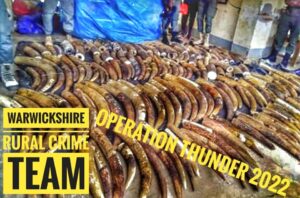Convention on the International Trade in Endangered Species
 Officers from the RCT have contributed to the international Operation targeting the sale, importation and exportation of endangered species.
Officers from the RCT have contributed to the international Operation targeting the sale, importation and exportation of endangered species.Coordinated by INTERPOL and the World Customs Organization (WCO), to tackle the Illegal trade in protected and endangered species. RCT officers have conducted visits to antique centers known to trade in protected items, as well as spot checks on other establishments suspected of selling related items of interest.
Codenamed Thunder 2022, the month-long (October) operation involved customs, police, financial intelligence units and wildlife and forestry enforcement agencies in 118 countries: the largest number of participating countries since the annual operation started in 2017.
Thousands of cars, trucks and cargo ships suspected of transporting protected wildlife and timber were searched at checkpoints in all regions, often with specialist sniffer dogs and X-ray scanners.
Searches targeted illegally traded CITES-listed specimens, ranging from timber to live big cats, primates, reptiles and birds, as well as derivative products including clothing, beauty products, food items, traditional medicines and handicrafts.
“What is Cites”
The Convention on International Trade in Endangered Species of Wild Fauna and Flora (CITES) was first drafted in 1963 after a meeting of IUCN (The World Conservation Union) members. The text was formally adopted by 80 countries in 1973 and 183 countries are now members.
CITES regulates the trade of over 35,000 species globally, breaking them down into three categories:
Appendix I – These are the world’s most endangered animals and plants, many of which are threatened with extinction, including tigers and mongooses.
Appendix II – This category includes species that are not yet threatened by extinction, but may become so if unlimited trade was allowed, and includes many species of coral.
Appendix III – The lowest level, which includes species which are only regulated in a specific country.
Decisions to upgrade or downgrade species are made at the CITES Conference of the Parties, which takes place every two to three years.
Please don’t hesitate to contact our team if you suspect someone is illegally trading in any of the item types mentioned above – ruralcrimeteam@warwickshire.police.uk.
RCT
